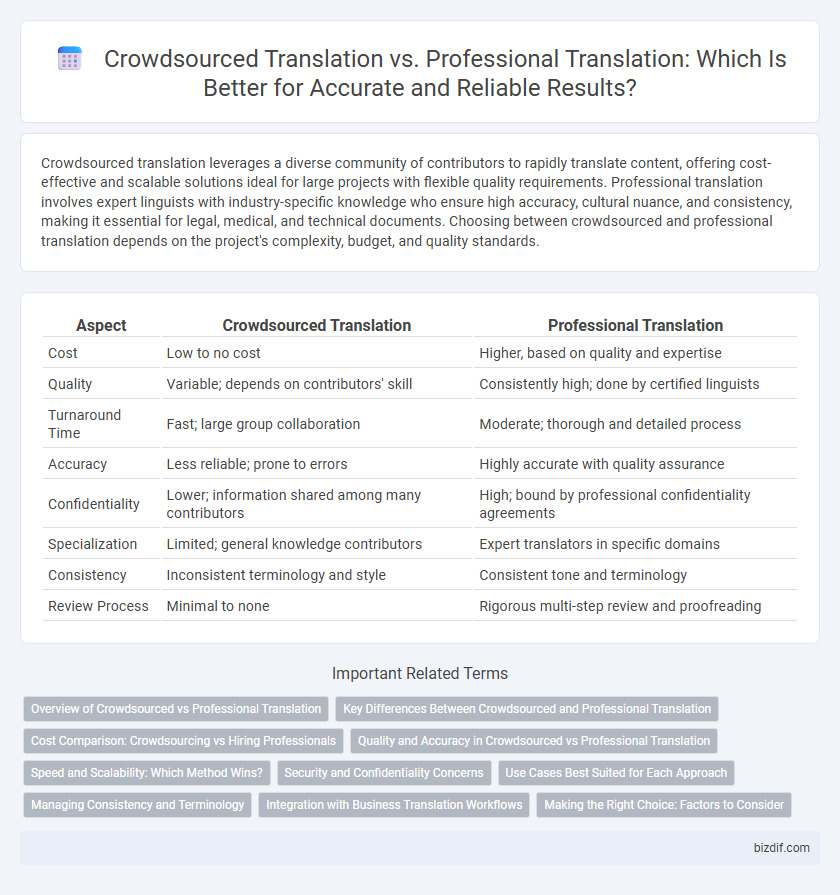Crowdsourced translation leverages a diverse community of contributors to rapidly translate content, offering cost-effective and scalable solutions ideal for large projects with flexible quality requirements. Professional translation involves expert linguists with industry-specific knowledge who ensure high accuracy, cultural nuance, and consistency, making it essential for legal, medical, and technical documents. Choosing between crowdsourced and professional translation depends on the project's complexity, budget, and quality standards.
Table of Comparison
| Aspect | Crowdsourced Translation | Professional Translation |
|---|---|---|
| Cost | Low to no cost | Higher, based on quality and expertise |
| Quality | Variable; depends on contributors' skill | Consistently high; done by certified linguists |
| Turnaround Time | Fast; large group collaboration | Moderate; thorough and detailed process |
| Accuracy | Less reliable; prone to errors | Highly accurate with quality assurance |
| Confidentiality | Lower; information shared among many contributors | High; bound by professional confidentiality agreements |
| Specialization | Limited; general knowledge contributors | Expert translators in specific domains |
| Consistency | Inconsistent terminology and style | Consistent tone and terminology |
| Review Process | Minimal to none | Rigorous multi-step review and proofreading |
Overview of Crowdsourced vs Professional Translation
Crowdsourced translation leverages a diverse community of volunteers or non-expert contributors to achieve rapid, cost-effective multilingual content, often ideal for informal or large-scale projects. Professional translation involves certified linguists with subject-matter expertise ensuring high accuracy, cultural relevance, and industry-specific terminology, suitable for legal, medical, and technical documents. The choice between crowdsourced and professional translation depends on project complexity, quality requirements, and budget constraints.
Key Differences Between Crowdsourced and Professional Translation
Crowdsourced translation leverages a diverse community of contributors, often resulting in faster and more cost-effective outputs but with varying quality and consistency. Professional translation relies on certified linguists with subject-matter expertise, ensuring accuracy, cultural nuance, and industry-specific terminology adherence. Key differences include quality control processes, turnaround times, scalability, and suitability for complex or legally sensitive content.
Cost Comparison: Crowdsourcing vs Hiring Professionals
Crowdsourced translation often offers significantly lower costs compared to hiring professional translators, leveraging a global pool of volunteers or freelance contributors who work for minimal compensation or voluntarily. Professional translation services, by contrast, involve higher expenses due to quality assurance processes, certified expertise, and specialized knowledge in industry-specific terminology. Businesses must weigh the cost savings of crowdsourcing against the higher accuracy, reliability, and consistent quality typically delivered by professional translation agencies.
Quality and Accuracy in Crowdsourced vs Professional Translation
Crowdsourced translation often sacrifices quality and accuracy due to varying skill levels of contributors and lack of standardized review processes. Professional translation delivers higher accuracy by employing certified linguists specializing in subject matter, ensuring consistency and cultural nuance. Projects demanding precision and brand integrity benefit significantly from professional translation services over crowdsourced alternatives.
Speed and Scalability: Which Method Wins?
Crowdsourced translation offers unmatched speed and scalability by leveraging a global pool of contributors to handle large volumes of content simultaneously, making it ideal for rapidly evolving projects or user-generated content. Professional translation, while slower due to rigorous quality control and expert review, ensures consistent accuracy and cultural nuance necessary for high-stakes or brand-sensitive materials. When speed and scalability are paramount, crowdsourced translation excels, but maintaining professional quality often requires integrating both methods strategically.
Security and Confidentiality Concerns
Crowdsourced translation often raises significant security and confidentiality concerns due to the involvement of numerous anonymous contributors, increasing the risk of sensitive information exposure. Professional translation services implement strict data protection protocols, including non-disclosure agreements and secure data handling, to safeguard client content. Choosing professional translators ensures compliance with industry-specific confidentiality standards and reduces the likelihood of information breaches.
Use Cases Best Suited for Each Approach
Crowdsourced translation excels in projects requiring rapid localization of large volumes of user-generated content, such as social media posts, product reviews, and community-driven platforms, where diverse linguistic input enhances cultural relevance. Professional translation is best suited for legal documents, technical manuals, and marketing materials demanding high accuracy, confidentiality, and specialized terminology. Hybrid approaches combine crowdsourcing for initial drafts with professional review to balance scalability and quality in e-learning content and global app interfaces.
Managing Consistency and Terminology
Crowdsourced translation offers scalability but often struggles with maintaining consistency and precise terminology across large projects. Professional translation leverages specialized expertise and centralized glossaries to ensure uniform terminology and style throughout the content. Effective management tools like translation memory systems and termbases are essential for both methods to achieve coherent and accurate translations.
Integration with Business Translation Workflows
Crowdsourced translation offers rapid scalability and cost efficiency by leveraging a diverse pool of contributors, making it suitable for dynamic content updates in business translation workflows. Professional translation provides high accuracy and consistent quality, essential for maintaining brand voice and compliance in legal or technical documents within corporate environments. Combining both approaches allows businesses to optimize workflow integration, balancing speed and precision depending on project criticality.
Making the Right Choice: Factors to Consider
Choosing between crowdsourced translation and professional translation depends on factors such as project complexity, accuracy requirements, and budget constraints. Crowdsourced translation offers cost-effectiveness and speed for simple tasks, while professional translation ensures high-quality, culturally accurate content essential for legal, medical, or technical documents. Evaluating the target audience's expectations and the importance of brand reputation helps determine the optimal translation approach.
Crowdsourced Translation vs Professional Translation Infographic

 bizdif.com
bizdif.com